Learning a new language is exciting, but it can also feel frustrating when apps don’t deliver real results. That’s where Rocket Languages comes in.
If you’ve ever wondered, “Can this program actually help me speak a new language with confidence?” you’re in the right place.
In this review, I’ll walk you through Rocket’s features, pros and cons, pricing, and how it compares to competitors so you can decide if it’s the right fit for your learning journey.
By the end, you’ll know exactly whether Rocket Languages can push you closer to fluency, or if you should look elsewhere. Let’s dive in!
Is Rocket Languages Any Good?
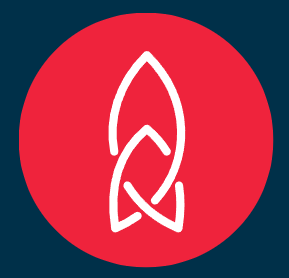
Rocket Languages isn’t a flashy, game-like app it’s a structured language program built for people who want results.
- It focuses on speaking, listening, and real-world conversations instead of just word memorization.
- Learners who commit see better long-term retention compared to casual apps.
- But it’s not for everyone. If you want bite-sized gamified learning (like Duolingo), Rocket may feel too intense.
👉 verdict: Rocket Languages is good if you want a serious, classroom-style experience in an app format.
Rocket Languages Program Features
🎧 Audio Lessons & Conversations
Lessons are built around real dialogues. Instead of memorizing random words, you practice conversations you’d actually use, like ordering food or asking directions.
🗣️ Voice Recognition
The app makes you speak out loud and checks your pronunciation. It’s not flawless, but it pushes you to practice speaking daily, which most apps ignore.
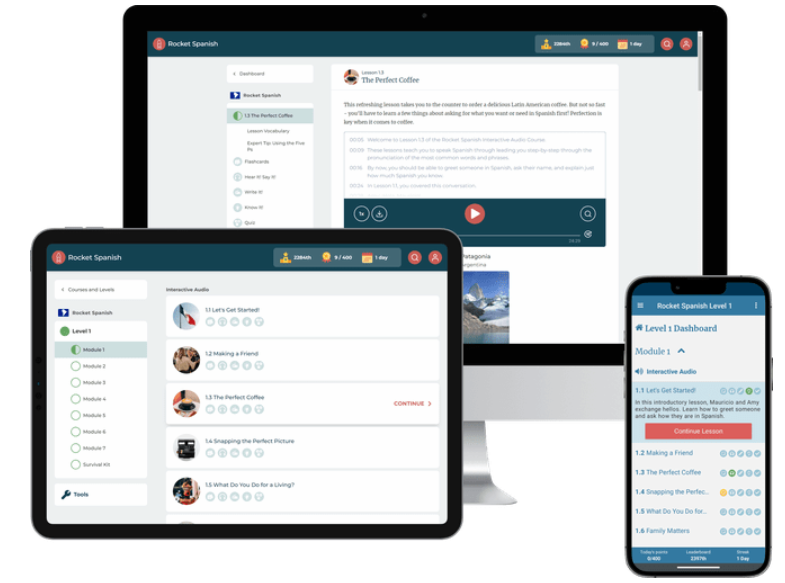
📚 Culture & Grammar
Grammar and cultural tips are explained in simple, everyday language, so you understand how and when to use phrases naturally.
📱 Mobile & Offline Access
Download lessons to study on the go. Progress syncs across devices, so you can switch between desktop and mobile.
🔒 Lifetime Access
Pay once, and you own it forever. No subscriptions, no renewals just lifetime access to your course.
🏆 Progress Tracking & Motivation
Rocket uses badges, points, and a visible progress bar to keep you motivated. Each lesson you complete gives you a small win, making it easier to stay consistent.
👉 In short: Rocket focuses on speaking, context, and real-life use, giving you a more practical foundation than gamified apps.
Rocket Languages for Beginners, Intermediate & Advanced
- Beginners 🟢:
Great starting point. Lessons are step-by-step, with simple dialogues and cultural tips that make learning natural. - Intermediate learners 🟡:
Useful for reinforcing skills and building confidence in everyday conversations, though the pace may feel slow if you already know the basics. - Advanced learners 🔵:
Limited depth, but still helpful for polishing pronunciation and refreshing earlier knowledge.
👉 In short: Rocket is strongest for beginners and lower-intermediates, while advanced learners may find it better as a refresher.
Voice Recognition & Speaking Focus
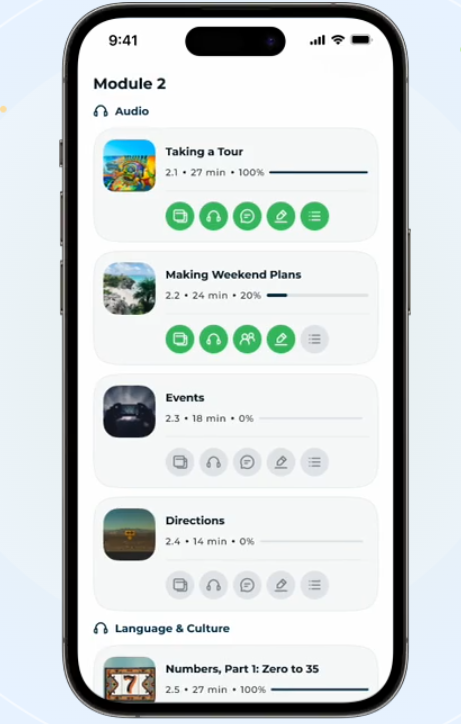
One of Rocket’s unique selling points is its speaking-first approach.
Instead of just tapping words on a screen, you say sentences out loud and compare them to native speakers. Over time, this builds confidence in speaking the hardest part of language learning.
Example: In Rocket Spanish, you won’t just memorize “Tengo hambre” (I’m hungry). You’ll practice saying it, hear how it’s used in a restaurant dialogue, and repeat it until it sounds natural.
Yes, sometimes the recognition tool mishears you, but that’s a push to fine-tune your pronunciation.
Study Activities That Reinforce Learning
Rocket doesn’t just teach once and move on. Each lesson ends with reinforcement tools:
- Flashcards (recognition and recall)
- Quiz questions
- Writing prompts
- Roleplay dialogues
This system, called the Rocket Reinforcement loop, ensures new vocabulary moves into long-term memory.
👉 It feels like your personal tutor is constantly testing you until the knowledge sticks.
How Many Languages Does Rocket Languages Offer?
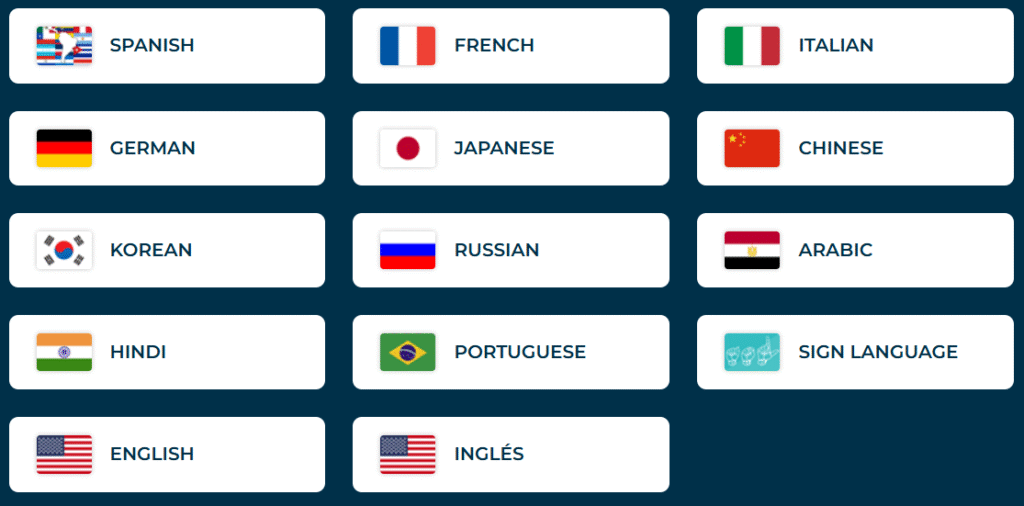
Rocket currently covers 15+ languages, including:
- Popular: Spanish, French, German, Italian, Japanese, Chinese.
- Others: Arabic, Hindi, Korean, Portuguese.
- Unique: American Sign Language (ASL).
👉 Competitors like Duolingo have more languages, but Rocket focuses on depth instead of variety.
Comparison With Competitors
| Platform | Best For | Weaknesses |
|---|---|---|
| Rocket Languages | Speaking-focused, lifetime access, structured | Repetitive drills, no live tutoring |
| Rosetta Stone | Immersion with visuals | Expensive, limited grammar explanations |
| Pimsleur | Audio learners, on-the-go | Weak in reading/writing |
| Duolingo | Free, fun, casual learning | Too shallow for fluency |
| Babbel | Affordable & practical | Subscription model, fewer hours |
How Much Does Rocket Languages Cost?
Rocket Languages uses a one-time payment model, which means you buy the course once and keep it forever no monthly subscription fees. This is different from apps like Babbel or Duolingo, which require ongoing payments.
💰 Typical Price Range
- Single Level (Beginner to Intermediate): around $99.95
- Two Levels (Beginner to Advanced Conversational): around $249.90
- Three Levels (Beginner to Advanced): around $259.90
👉 Prices vary slightly depending on the language and promotions, but they often run discounts up to 40–60% off.
🎓 Example: Rocket German Pricing (with discount applied)
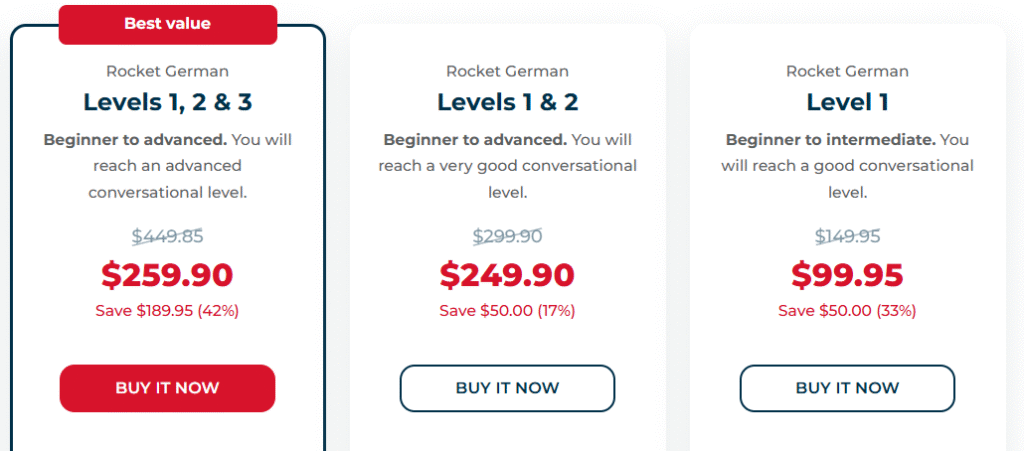
- Rocket German Level 1 (Beginner → Intermediate):
Regular $149.95 → Discounted $99.95 (33% off) - Rocket German Levels 1 & 2 (Beginner → Advanced Conversational):
Regular $299.90 → Discounted $249.90 (17% off) - Rocket German Levels 1, 2 & 3 (Beginner → Advanced):
Regular $449.85 → Discounted $259.90 (42% off, best value)
DISCOUNT CODE – ROCKETDEAL

Pros and Cons of Rocket Languages
✅ Pros
- Motivational progress tracker – keeps you engaged with points and streaks.
- Extensive lesson hours – over 60+ hours per level.
- Offline access – perfect for flights, road trips, or low-Wi-Fi areas.
- Lifetime access – no recurring subscription fees.
- American Sign Language (ASL) – few competitors offer this option.
❌ Cons
- Repetition fatigue – drills can get boring if you prefer variety.
- Surface-level culture lessons – they don’t go very deep into traditions or history.
- Voice recognition errors – especially if your accent differs.
- Limited formats – no video calls or live tutor sessions.
Is Rocket Languages Worth It? (Final Verdict & Conclusion)
Rocket Languages isn’t the flashiest program out there, but it’s built for learners who want serious results. It focuses on real conversations, structured practice, and lifetime access which makes it stand out from most subscription-based, game-like apps.
✅ Worth it if:
- You’re a beginner or lower-intermediate learner who wants a structured path.
- You prefer speaking-focused lessons with lots of practice.
- You like the idea of a one-time payment with lifetime access.

❌ Not worth it if:
- You want highly gamified learning (like Duolingo).
- You need live teacher feedback.
- You’re already advanced and want specialized fluency training.
👉 Final Verdict: Rocket Languages won’t make you fluent overnight, but it will take you from knowing nothing to feeling confident in everyday conversations. If you’re motivated, willing to practice consistently, and prefer a one-time investment over ongoing subscriptions, Rocket is definitely worth considering.

FAQs
Yes, if your goal is conversational fluency. Duolingo is fun, but Rocket is deeper and more structured.
Yes you can try sample lessons before buying.
3–6 months per level with consistent study.
Yes, lessons are downloadable in the app.
Currently 15+ options, including ASL, but not as many as Duolingo.

